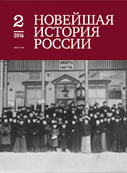Военные секреты в довоенном Парламенте царской России
Military Secrets in Parliament of Pre-war Tsarist Russia
Author(s): V. O. ZverevSubject(s): History
Published by: Издательство Исторического факультета СПбГУ
Keywords: commission of the National Defense; military secrets; military circle secrecy; newspapers; private meetings; espionage
Summary/Abstract: On the eve of the 110th anniversary of the founding of the national parlia-mentarizma, it presented the first in modern Russian historiography attempt to comprehend the secret military aspects of the activities of institutions of higher legal power. The ways of entering a military significant (military secret) information to the profile committee of the State Duma and the Council of State (the National Defence Committee, Financial Committee and others.). AI noted private participation Guchkov and N. V. Savic in identifying the problems the Russian army and navy, and with them, and military secrets. Established a wide range of communication among the army and marine officers and generals. Normative legal acts regulating the functioning of the mechanism of preserving military secrets (mode of privacy in the Parliament). The estimation of its neeffek-efficiency, and the inability to solve unusual problems using standard policing.The ways of the «brain» of military secrets from the State Duma and the State Council. The first of these was associated with replication military secrets to a wide readership in the press (thanks to the work of journalists). The second channel embezzlement of military classified information and non-classified information, but could interest foreign intelligence services is their propagation through oral statements of deputies and members of the State Council in general meetings. With the «tolerance» of all deputies to the dissemination of confidential correspondence (addressed to the Parliament) we associate the presence of the third channel loss information of national importance, and with them, and documents for internal use only. Finally, the fourth channel loss information, particular importance is their initiative and legal transfer of foreign institutions of political power. By the beginning of World War I the government, political institutions, and with them the intelligence agencies of interested powers (of the enemies of Russia) could have a sufficient understanding of the main directions of the reform of the Russian armed forces, the content and its major lending projects. Introduction to the scientific revolution of previously unknown experts archival documents and materials of Russian press has allowed to substantiate the version of the current practice of mass «brain» of military secrets from zakonosoveschatelnogo institutions interwar Russia (including abroad).
Journal: Новейшая история России
- Issue Year: 6/2016
- Issue No: 16
- Page Range: 83-94
- Page Count: 12
- Language: Russian

